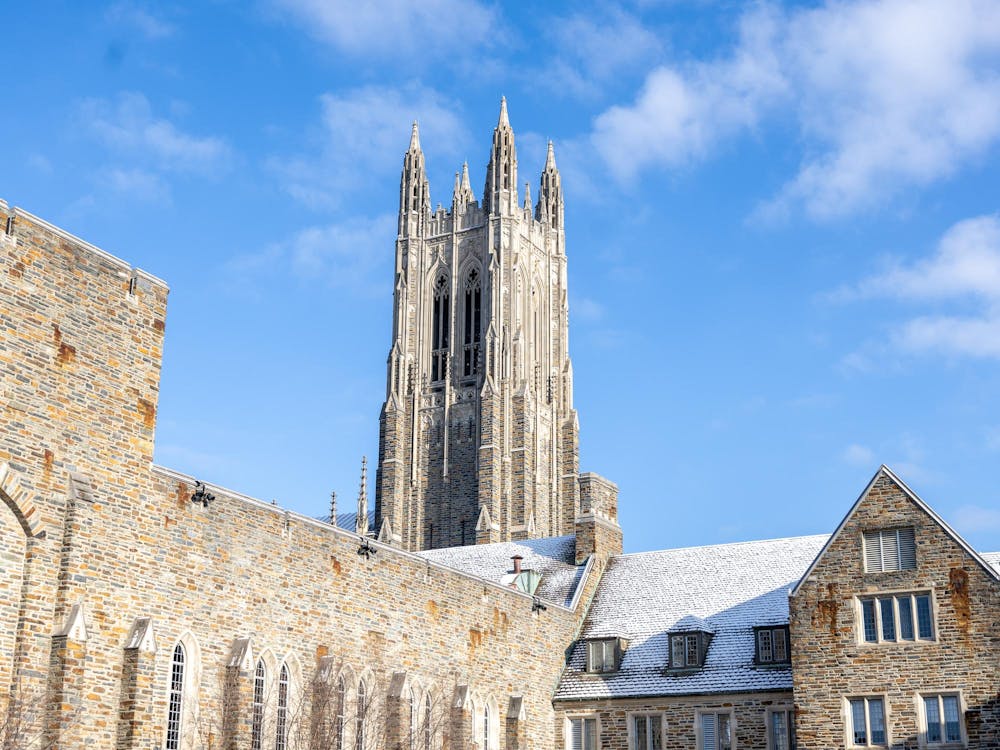The Academic Council’s Committee on Academic Freedom and Responsibility, Freedom of Expression and Engagement held a town hall Wednesday to hear feedback from community members about their perception of academic freedom on campus.
The event centered mainly on attendees’ experiences with free speech and self-censorship, with additional time spent on institutional neutrality and concerns around the University’s Pickets, Protests and Demonstrations (PPD) policy.
The committee, which was created last spring, plans to use the feedback from the town hall and questionnaire responses to inform their ultimate advice to University administration. Charlotte Sussman, chair of the committee, professor of English and chair of the English department, affirmed Wednesday that the committee’s final recommendations will be made publicly available.
Balancing free speech, individual safety
On the whole, Professor of German Studies Stefani Engelstein commended Duke’s existing academic freedom policy, noting that “it seems to [her] that the only place [Duke] can go from here is less freedom.”
Yet, attendees pointed to a continuing tension between ensuring all community members can express themselves fully and honestly without impeding on the free speech of others.
Protecting students’ personal safety remains a priority for the council, which has become more pressing following the Oct. 7, 2023, attack on southern Israel by militant group Hamas and the ensuing demonstrations on U.S. college campuses.
Junior Carson Lender shared her experience of having Jewish friends at other schools who reported “terrible stories of … going home and even receiving death threats at the extreme.” While she maintained that she “did feel safe on Duke’s campus,” she wondered how the University plans to navigate balancing freedom of speech with students’ sense of safety and well-being.
This tension is also visible in classrooms. David Malone, professor of the practice of education, reported students “saying they felt unsafe when other students wore certain things” such as “slogans, hats and buttons.”
But multiple attendees, including Engelstein, stressed the importance of distinguishing between safety and comfort and of protecting controversial, occasionally uncomfortable views.
“Nobody has trouble supporting the right of people who think the same way that they do to speak; it’s only when people start wanting to say things that make us profoundly uncomfortable that we feel tempted to put other things above free discourse,” she said. “I guess I just want to articulate how important it is … to be able to bear that discomfort.”
Reports of self-censorship
Students reported occasionally censoring themselves in the classroom out of fear of judgment from faculty or their peers. According to sophomore Katie Swayne, some students worry their work will be graded poorly by their professors — not because of the quality of their writing, but because of the beliefs they express.
Juan José Hernandez, the director of the Duke Catholic Center, echoed Swayne, saying that many students who speak to him feel the need to restrict their comments in the classroom.
While student freedom of speech is closely related to academic freedom, it is not the direct focus of the committee’s deliberations, Sussman said. She referenced the Provost’s Initiative on Free Inquiry, Pluralism and Belonging, which is more directly concerned with campus dialogue and student concerns.
Some students reported being more worried about repercussions from University administration than their instructors. Junior Sofia Cava, co-president of Duke Beyond Borders, noted that the club considered protesting Thursday’s career fair where U.S. Immigration and Customs Enforcement (ICE) recruiters would be in attendance but decided not to for fear of backlash.
Faculty also critiqued the University’s PPD policy as being “dangerously vague,” with Engelstein noting that the policy does not define what constitutes “noise” and “disruption” as opposed to “speech,” which she believes could result in students and faculty being disciplined “in direct violation” of Duke’s academic freedom policy.
Speaking as a member of Academic Council’s Executive Committee, Campbell Harvey, J. Paul Sticht distinguished professor of international business in the Fuqua School of Business, stated that the council is “very aware” of the issues surrounding the PPD policy’s relationship to free speech and that addressing it is “a high priority.”
Institutional neutrality
Timor Kuran, Gorter family distinguished professor of Islamic studies, professor of economics and political science and one of the organizers of a recent Duke faculty petition for institutional neutrality, recalled having conversations with about 150 faculty members who reported being afraid of expressing their support for the cause, by both their department chair or colleagues and “the administration — of the Allen Building.”
Get The Chronicle straight to your inbox
Sign up for our weekly newsletter. Cancel at any time.
He noted that while the petition had 140 signatures as of Monday, representing under 4% of Duke’s total faculty population, a Chronicle survey of faculty members conducted last spring found that over 60% of faculty were either “strongly” or “somewhat” in support of such a policy.
“What institutional neutrality says is rather simple,” said Research Professor of Economics Bruce Caldwell, expressing his support for such a policy. “… If we’re going to ensure freedom of expression among all the members of the community, the institution itself should not be taking a specific stand on controversial issues of the day, unless those issues directly affect its ability to pursue its mission.”
But other professors critiqued institutional neutrality as an unrealistic goal, pointing to necessary decisions on investment practices and other actions they characterized as inherently political.
Sussman said that the committee is “interested in the intersection” between academic freedom and institutional neutrality and is having “robust conversations about it.”

